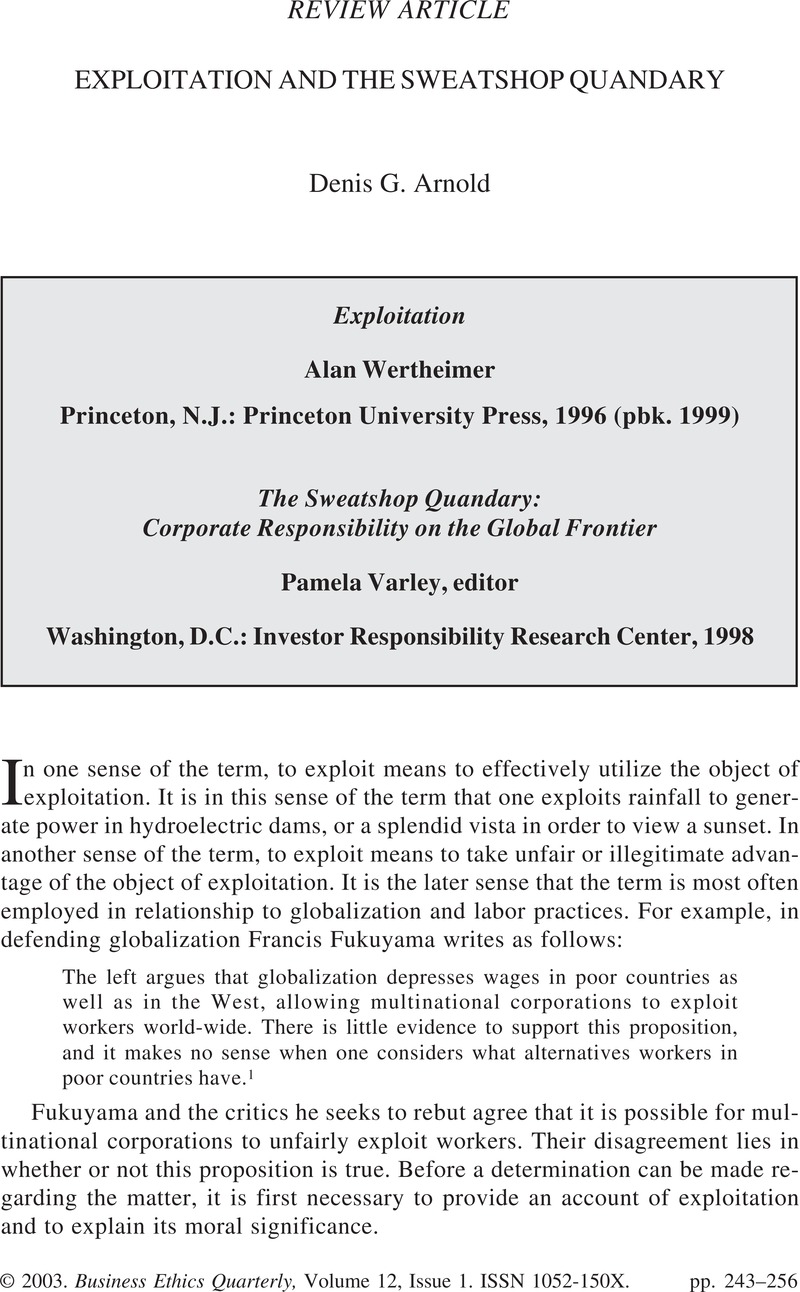Article contents
Exploitation and the Sweatshop Quandary - ExploitationAlan Wertheimer Princeton, N.J.: Princeton University Press, 1996 (pbk. 1999) - The Sweatshop Quandary: Corporate Responsibility on the Global FrontierPamela Varley, editor Washington, D.C.: Investor Responsibility Research Center, 1998
Published online by Cambridge University Press: 23 January 2015
Abstract

- Type
- Review Articles
- Information
- Copyright
- Copyright © Society for Business Ethics 2003
References
Notes
1 Francis Fukuyama, “The Left Should Love Globalization,” The Wall Street Journal, December 1, 1999.
2 See, for example, Richard J. Arneson, “What’s Wrong with Exploitation?,” Ethics 91 (1981): 202–227; John Roemer, A General Theory of Exploitation and Class (Cambridge: Harvard University Press, 1982); Justin Schwartz, “In Defence of Exploitation,” Economics and Philosophy 11 (1995): 275–307; and the essays collected in Kai Nelson and Robert Ware, Exploitation (Atlantic Highlands, N.J.: Humanities Press, 1997).
3 Notable exceptions include Hillel Steiner, “A Liberal Theory of Exploitation,” Ethics 94 (1984): 225–241; Joel Feinberg, Harmless Wrongdoing (New York: Oxford University Press, 1988); Michael J. Gorr, Coercion, Freedom, and Exploitation (New York: Peter Lang, 1989); Allen W. Wood, “Exploitation,” Social Philosophy and Policy 12 (1995): 136–158; and Horace L. Fairlamb, “Adam Smith’s Other Hand: A Capitalist Theory of Exploitation,” Social Theory and Practice 22 (1996): 193–223.
4 Alan Wertheimer, Exploitation (Princeton: Princeton University Press, 1996), 13–14.
5 Wertheimer defends a moralized theory of coercion in Coercion (Princeton: Princeton University Press, 1987). For an outline of an empirical theory of coercion see Denis G. Arnold, “Coercion and Moral Responsibility,” American Philosophical Quarterly 38 (2001): 53–67.
6 Wood, “Exploitation,” 141–147.
7 Wertheimer, Exploitation, 230.
8 Ibid., 217.
9 Ibid., 231.
10 Ibid., 289.
11 Ibid., 294–295.
12 Ibid., 301.
13 Ibid., 304.
14 Ibid., 300–305.
15 Wertheimer makes this point concerning a distinct but related set of issues. Ibid., 234–236.
16 Pamela Varley, ed., The Sweatshop Quandary: Corporate Responsibility on the Global Frontier (Washington, D.C.: Investor Responsibility Research Center, 1998).
17 Varley acknowledges that the idea of a “sweatshop” is vague. She reports that “We use it in its broadest sense to refer to factories that are criticized for paying workers low wages and sometimes on other grounds as well.” Ibid., vi.
18 Ibid., 47.
19 Ibid., 48–49.
20 Ibid., 256.
21 An important recent exception is Ian Maitland, “The Great Non-Debate Over International Sweatshops,” British Academy of Management Conference Proceedings (September, 1997): 240–265.
22 Varley, The Sweatshop Quandary, 70.
23 Ibid., 67.
24 Ibid., 79.
25 Ibid., 95.
26 Ibid., 243 and 260.
27 Ibid., 260.
28 Ibid., 506.
29 Ibid., 448.
30 Ibid., 495.
31 Ibid., 258–259.
32 Ibid., 290–291.
33 Ibid., 215–221.
34 Ibid., 271.
35 Ibid., 298–299.
36 Wood, “Exploitation,” 155.
37 Ibid., 151.
38 Norman E. Bowie, Business Ethics: A Kantian Perspective (Malden, Mass.: Blackwell Publishers, 1999).
39 For such an argument see Denis G. Arnold and Norman E. Bowie, “Sweatshops and Respect for Persons,” Business Ethics Quarterly 13 (2003) 221–242.
- 21
- Cited by




